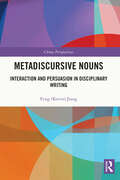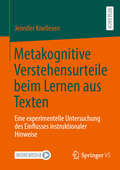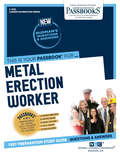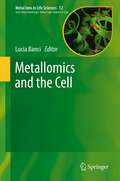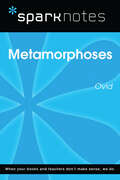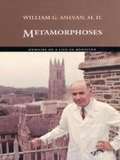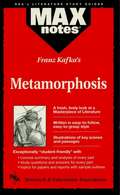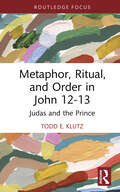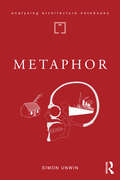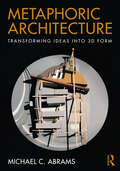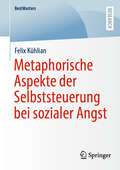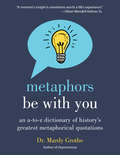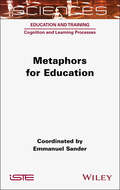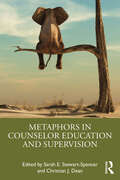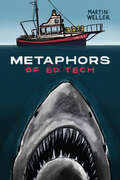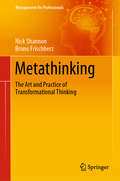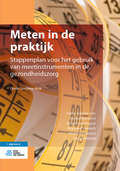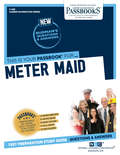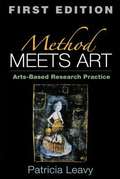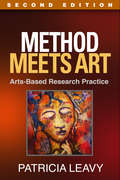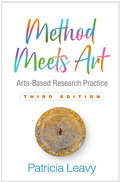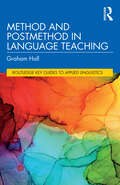- Table View
- List View
Metadiscursive Nouns: Interaction and Persuasion in Disciplinary Writing (China Perspectives)
by Feng (Kevin) JiangBased on a 1.7-million-word corpus of 160 research articles from both soft and hard knowledge fields, this book sets out to explore how a particular type of noun, namely, metadiscursive nouns are rhetorically used to mediate writer-reader interaction in disciplinary writing. Analysts of academic discourse have come to regard hedges, reporting verbs, directives and so on as forming part of a wide repertoire of interactive features available to authors, suggesting a variety of terms, including evaluation, stance, appraisal and metadiscourse. One aspect which has been less fully explored, however, is the rhetorical role nouns play in achieving writers’ persuasive goals. This book fills the gap by proposing a particular type of nouns as metadiscursive nouns (as in ‘this supports our hypotheses that youth are more likely to co-offend when neighborhoods are less disadvantaged’). The author aims to find out how writers employ metadiscursive nouns to engage and interact with readers in academic prose, raising theoretical and pedagogical implications and how they can be applied in the teaching of academic writing. This book will be of particular interest to students and scholars working in the areas of English for Academic Purposes, Corpus studies, Academic writing, and Linguistics in general.
Metakognitive Verstehensurteile beim Lernen aus Texten: Eine experimentelle Untersuchung des Einflusses instruktionaler Hinweise
by Jennifer KnellesenJennifer Knellesen untersucht in diesem Buch, ob instruktionale Hinweise über die Testanforderungen die Urteilsgenauigkeit von Lehramtsstudierenden beim Lernen aus Texten verbessern können. Ausgangspunkt ist, dass Studierende oft dazu neigen, ihr Verständnis zu überschätzen, was auf die Diskrepanz zwischen genutzten Hinweisen (Cues) und den kognitiven Anforderungen der Testfragen zurückgeführt werden kann. Instruktionale Hinweise sollen helfen, diagnostischere Cues zu nutzen und somit die Genauigkeit des Verstehensurteils zu erhöhen. In zwei randomisierten Experimenten mit Lehramtsstudierenden wurde der Einfluss verschiedener Leseinstruktionen auf die Urteilsverzerrung untersucht. Die Ergebnisse zeigen, dass Anwendungsinstruktionen zwar zu einem elaborierteren Leseprozess führten, jedoch ohne weitere Unterstützung nicht ausreichten, um die Überschätzung des Verständnisses signifikant zu reduzieren. Zudem weisen die Studien darauf hin, dass die Eigenschaften der Texte die Wirkung von instruktionalen Hinweisen beeinflussen können. Die Arbeit liefert damit wichtige Erkenntnisse für die Gestaltung effektiver Lernmaterialien im Hochschulkontext.
Metal Erection Worker: Passbooks Study Guide (Career Examination Series)
by National Learning CorporationThe Metal Erection Worker Passbook® prepares you for your test by allowing you to take practice exams in the subjects you need to study. It provides hundreds of questions and answers in the areas that will likely be covered on your upcoming exam.
Metallomics and the Cell
by Lucia BanciMetallomics and the Cell provides in an authoritative and timely manner in 16 stimulating chapters, written by 37 internationally recognized experts from 9 nations, and supported by more than 3000 references, several tables, and 110 illustrations, mostly in color, a most up-to-date view of the "metallomes" which, as defined in the "omics" world, describe the entire set of biomolecules that interact with or are affected by each metal ion. The most relevant tools for visualizing metal ions in the cell and the most suitable bioinformatic tools for browsing genomes to identify metal-binding proteins are also presented. Thus, MILS-12 is of relevance for structural and systems biology, inorganic biological chemistry, genetics, medicine, diagnostics, as well as teaching, etc.
Metamorphoses (SparkNotes Literature Guide Series)
by SparkNotesMetamorphoses (SparkNotes Literature Guide) by Ovid Making the reading experience fun Created by Harvard students for students everywhere, SparkNotes is a new breed of study guide: smarter, better, faster. Geared to what today's students need to know, SparkNotes provides: *Chapter-by-chapter analysis *Explanations of key themes, motifs, and symbols *A review quiz and essay topicsLively and accessible, these guides are perfect for late-night studying and writing papers
Metamorphoses: Memoirs of a Life in Medicine
by William G. AnlyanWilliam G. Anlyan, a dedicated doctor and gifted administrator, was a leader in the transformation of Duke University Hospital from a regional medical center into one of America's foremost biomedical research and educational institutions. Anlyan's fifty-five-year career at Duke University spanned a period of extraordinary change in the practice of medicine. He chronicles those transformations--and his role in them--in this forthright memoir.Born in Alexandria, Egypt, in 1925, and schooled in the British tradition, Anlyan attended Yale University as an undergraduate and medical student before coming to the relatively unknown medical school at Duke University in 1949 for an internship in general and thoracic surgery. He stayed on, first as a resident, then as a staff surgeon. By 1961, he was a full professor of surgery. In 1964, Anlyan was named dean of the medical school, the first in a series of administrative posts at the medical school and hospital. Anlyan's role in the transformation of the Duke University Medical Center into an internationally renowned health system is manifest: he restructured the medical school and hospital and supervised the addition of almost four million square feet of new or renovated space. He hired outstanding administrators and directed a staff that instituted innovative programs and groundbreaking research centers, such as the Cancer Center and the Physician's Assistant Program.Anlyan describes a series of metamorphoses in his own life, in the world of medicine, in Durham, and at Duke. At the time of his prep school upbringing in Egypt, medicine was a matter of controlling infectious diseases like tuberculosis and polio. As he became an immigrant medical student and then a young surgeon, he observed vast advances in medical practice and changes in the financing of medical care. During his tenure at Duke, Durham was transformed from a sleepy mill and tobacco town into the "City of Medicine," a place where patients routinely travel for open-heart surgery and cutting-edge treatments for cancer and other diseases.Anyone interested in health care, medical education, and the history of Duke University will find Anlyan's memoir of interest.
Metamorphosis (MAXNotes Literature Guides)
by Stanley TaikeffMAXnotes offer a fresh look at masterpieces of literature, presented in a lively and interesting fashion. Written by literary experts who currently teach the subject, MAXnotes will enhance your understanding and enjoyment of the work. MAXnotes are designed to stimulate independent thought about the literary work by raising various issues and thought-provoking ideas and questions. MAXnotes cover the essentials of what one should know about each work, including an overall summary, character lists, an explanation and discussion of the plot, the work's historical context, illustrations to convey the mood of the work, and a biography of the author. Each chapter is individually summarized and analyzed, and has study questions and answers.
Metaphor, Ritual, and Order in John 12-13: Judas and the Prince (Routledge Interdisciplinary Perspectives on Biblical Criticism)
by Todd E. KlutzThis book offers new interpretative insight into the Gospel of John, applying a combination of critical discourse analysis, conceptual metaphor theory, and anthropological theories of ritual. Specifically it explores the meaning of the statement “Now the ruler of this world will be driven out” in John 12:31 and defends a widely overlooked alternative reading. The author proposes a prophecy-fulfilment scheme whereby this predictive utterance by Jesus’ is subsequently implied as fulfilled in the departure of the satanically-possessed Judas’ from the circle of Jesus’ disciples at the Last Supper in John 13:30. Addressing several major strands relating to purity, exorcism, and group identity, the analysis provides an important entry-point for a fresh examination of the Fourth Gospel as a whole. The book represents a significant contribution to Johannine scholarship and to New Testament studies and will be of interest to scholars of religion, theology and biblical studies.
Metaphor: an exploration of the metaphorical dimensions and potential of architecture (Analysing Architecture Notebooks)
by Simon UnwinEach of these Analysing Architecture Notebooks is devoted to a particular theme in understanding the rich and varied workings of architecture. They can be thought of as addenda to the foundation volume Analysing Architecture, which first appeared in 1997 and has subsequently been enlarged in three further editions. Examining these extra themes as a series of Notebooks, rather than as additional chapters in future editions, allows greater space for more detailed exploration of a wider variety of examples, whilst avoiding the risk of the original book becoming unwieldy. Metaphor is the most powerful component of the poetry of architecture. It has been a significant factor in architecture since the earliest periods of human history, when people were finding ways to give order and meaning to the world in which we live. It is arguable that architecture began with the realisation of metaphor in physical form, and that subsequent movements – from Greek to Gothic, Renaissance to Modern, Victorian to Vernacular… – have all been driven by the emergence or rediscovery of different metaphors by which architecture might be generated.
Metaphoric Architecture: Transforming Ideas into 3D Form
by Michael C. AbramsMetaphoric Architecture focuses on a fundamental but often challenging part of the beginning design phases—how to take an abstract idea and transform it into a three-dimensional object, space, or building.Through media experimentation, analysis of innovative case studies, and hands-on exercises, Abrams guides the reader through the early stages of design, which include site and precedent analysis, among other initial approaches. To comprehend design thinking, the visual arts, music, and film are examined in relation to architecture. Chapters demonstrate how abstract ideas inspired by paintings, music, and films, can be utilized in the spatial design process and transformed into habitable spaces. There are 22 exercises that increase in complexity to strengthen students’ abilities and promote the use of digital and manual representation in a back-and-forth motion. With 444 illustrations, this book demystifies the process of designing 3D form and space in a highly visual way.It will be the ideal studio companion for beginning and intermediate students of both architecture and interior design, with a wide range of architectural lessons that include abstraction, design fundamentals, concept development, building design, case study analysis, and site-to-building relationships.
Metaphorische Aspekte der Selbststeuerung bei sozialer Angst (BestMasters)
by Felix KühlianFelix Kühlian erkundet in diesem Buch die systematische Verwendung von Metaphern in der Interaktion zwischen systemischen Psychotherapeut*innen und Menschen mit der Diagnose soziale Angst. Das Konzept der Selbststeuerung wird aus interdisziplinärer Perspektive betrachtet und auf der Basis der kognitiven Metapherntheorie für eine Systematische Metaphernanalyse aufbereitet. Dabei werden systemtheoretische Grundlagen mit psychologischen Erkenntnissen und therapiepragmatischen Überlegungen zum Selbst und zur Selbststeuerung integriert. So wird ein Weg zu einer Analyse der systematischen Verwendung von Metaphern bereitet, der zugleich für Praktiker*innen und Theoretiker*innen Relevanz hat.
Metaphors Be With You: An A to Z Dictionary of History's Greatest Metaphorical Quotations
by Dr Mardy GrotheRespected quotation anthologist and author of Oxymoronica and Viva la Repartee Dr. Mardy Grothe is at his best in Metaphors Be with You, an A to Z dictionary of 2,750 of history's greatest metaphorical quotations, meticulously curated for writers, readers, and quotation lovers everywhere.In Metaphors Be with You, Dr. Mardy Grothe has created the definitive reference on English's finest metaphors, sourced from literature, politics, philosophy, Hollywood, religion, sports, comedy, history, religion, pop culture, and more. Arranged into two sections--"The Ten Best Things Ever Said" and "The Single Best Thing Ever Said"--Metaphors Be with You includes quotations on five hundred human interest topics and an introduction to the nature, importance, and sheer joy of metaphorical language.Essential for writers, readers, and language aficionados, this breathtaking, beautifully designed sourcebook also contains elegantly integrated digital access to Dr. Mardy's Dictionary of Metaphorical Quotations, the world's largest online database of quotations containing metaphors, similes, and analogies. This one-of-a-kind synergy between print and technology offers a comprehensive look at the diversity of words and phrases we use to relate to, understand, and describe our world by providing access to detailed source information, innumerable "Error Alerts," and fascinating quotation backstories that will engage readers as they delve into metaphorical language and discover their own favorites.Whether you're crafting a speech, writing a novel, or simply searching for new ways to express yourself, this remarkable compendium is sure to inspire you with the perfect metaphor every time.
Metaphors for Education (ISTE Invoiced)
by Emmanuel SanderMetaphors are more than just linguistic tools; they go far beyond this. By drawing on the known to illuminate the unknown, they shape understanding and profoundly influence learning dynamics, making them particularly relevant in education. Metaphors for Education explores this theme in depth, offering a comprehensive and enlightening overview of the role and place of metaphors in the field of education. The book examines how metaphors shape pedagogical approaches and conceptions of teaching, and influence learning processes and conceptual development, as well as impact assessment, differentiation and the professional identity of teachers. It also shows how metaphors can provide powerful tools for reflection and transformation in educational practices. Aimed at teachers, students, educational researchers and enthusiasts alike, this book offers fresh and stimulating perspectives on the contribution of metaphors to learning and teaching.
Metaphors in Counselor Education and Supervision
by Sarah E. Stewart-SpencerMetaphors in Counselor Education and Supervision provides counselor educators and supervisors with creative applications of metaphors to help students and supervisees who struggle with abstract clinical concepts or foundational clinical skills. This teaching and supervision guide provides a variety of metaphors to clarify different areas of counselor education and supervision, including but not limited to case conceptualization, self-care, the counseling process, countertransference, suicide assessments, and advocacy. Each metaphor is accompanied by ethical and cultural considerations, group supervision modifications, and alternative uses to help emphasize diversity and ethics. This book will prepare supervisees and students with unique methods for teaching and understanding counseling concepts and skills and supply professional counselors with creative and different perspectives to use in practice.
Metaphors of Depth in German Musical Thought
by Holly WatkinsWhat does it mean to say that music is deeply moving? Or that music's aesthetic value derives from its deep structure? This study traces the widely employed trope of musical depth to its origins in German-language music criticism and analysis. From the Romantic aesthetics of E. T. A. Hoffmann to the modernist theories of Arnold Schoenberg, metaphors of depth attest to the cross-pollination of music with discourses ranging from theology, geology and poetics to psychology, philosophy and economics. The book demonstrates that the persistence of depth metaphors in musicology and music theory today is an outgrowth of their essential role in articulating and transmitting Germanic cultural values. While musical depth metaphors have historically served to communicate German nationalist sentiments, Watkins shows that an appreciation for the broad connotations of those metaphors opens up exciting new avenues for interpretation.
Metaphors of Ed Tech (Issues in Distance Education)
by Martin WellerThe criticisms leveled at online education during the Covid-19 pandemic revealed not only a lack of understanding about how educational technology can be deployed effectively, but a lack of imagination. In this refreshing and insightful volume, Martin Weller provides new ways of thinking about educational technology through a wide range of metaphors. By using metaphors as a mental model, Weller enables educators to move beyond pragmatic concerns into more imaginative and playful uses of technology and to critically examine the appropriate implementation and adoption of ed tech.
Metathinking: The Art and Practice of Transformational Thinking (Management for Professionals)
by Bruno Frischherz Nick ShannonThis book compels professionals to actively imbibe self-awareness in their thought process in order to help them manage complexities in business. The authors explore dialectical thinking –in contrast to logical thinking—and introduce a new mind-opening thinking process called “Metathinking”. Four case studies demonstrate the application of Metathinking. The reader shall come across, and learn from, a multitude of mind opening questions on a variety of topics, with particular focus on leadership and transformation. Practical exercises are also offered for training and discussion in the workplace.
Meten in de praktijk: Stappenplan voor het gebruik van meetinstrumenten in de gezondheidszorg
by Hester Vermeulen Harriët Wittink Sandra Beurskens Raymond Swinkels Roland Van PeppenHet doel van dit boek is om je aan de hand van een stappenplan te leren op een systematische en kritische manier het juiste meetinstrument te zoeken, te selecteren en de uitkomsten te interpreteren en integreren in het behandelproces. Het uitgangspunt is dat meten geen doel op zich is maar dat het meten processen ondersteunt. Als dat niet het geval is, is het gebruik van meetinstrumenten tijdsverspilling voor zorgprofessionals én patiënten en moet je het niet doen. In de dagelijkse zorg hebben zorgprofessionals veel vragen. Wat wil een patiënt bereiken? Waar gaan we aan werken? Wat zijn de effecten van de zorg? Moet de behandeling worden bijgesteld? Door meten worden deze zaken verhelderd en geobjectiveerd. De zorgprofessional en patiënt hebben hier profijt van, zowel bij het bepalen van de diagnose, het voorspellen van het beloop van het herstel, het samen bepalen van het doel en het evalueren van een behandeling. Meten in de praktijk - Stappenplan voor het gebruik van meetinstrumenten in de gezondheidszorg is onmisbaar voor zorgprofessionals, studenten en docenten aan gezondheidszorgopleidingen in het hoger onderwijs. Daarnaast is het een handige gids voor professionals en kwaliteitsmedewerkers die werkzaam zijn in de gezondheidszorg. In deze derde druk zijn twee hoofdstukken toegevoegd waarbij het accent ligt op het interpreteren en gebruiken van de resultaten in het zorgproces. Verder wordt samengewerkt met de website www.meetinstrumentenzorg.nl waardoor de meetinstrumenten en de gebruikersinformatie vrij toegankelijk beschikbaar zijn. Aansluitend op de patiëntgerichte benadering, ligt het accent in het boek op de zogenaamde 'patiënt reported outcomes' (PRO's). Meten in de praktijk is een prachtig hulpmiddel bij zinvol inzetten van meetinstrumenten waarbij de zorgprofessional en de patiënt gezamenlijk het doel en verloop van de behandeling bespreken en bepalen en deze na afloop evalueren. De focus in dit boek ligt meer op ‘Weten waarom en wat je wilt meten’ dan op het bekende ‘Meten is weten’.
Meter Maid: Passbooks Study Guide (Career Examination Series #C-498)
by National Learning CorporationThe Meter Maid Passbook® prepares you for your test by allowing you to take practice exams in the subjects you need to study. It provides hundreds of questions and answers in the areas that will likely be covered on your upcoming exam.
Method Meets Art
by Patricia LeavyThis book presents the first comprehensive introduction to arts-based research (ABR) practices, which scholars in multiple disciplines are fruitfully using to reveal information and represent experiences that traditional methods cannot capture. Each of the six major ABR genres--narrative inquiry, poetry, music, performance, dance, and visual art--is covered in chapters that introduce key concepts and tools and present an exemplary research article by a leading ABR practitioner. Patricia Leavy discusses the kinds of research questions these innovative approaches can address and offers practical guidance for applying them in all phases of a research project, from design and data collection to analysis, interpretation, representation, and evaluation. Chapters include checklists to guide methodological decision making, discussion questions, and recommended print and online resources.
Method Meets Art
by Patricia LeavyThis book presents the first comprehensive introduction to arts-based research (ABR) practices, which scholars in multiple disciplines are fruitfully using to reveal information and represent experiences that traditional methods cannot capture. Each of the six major ABR genres--narrative inquiry, poetry, music, performance, dance, and visual art--is covered in chapters that introduce key concepts and tools and present an exemplary research article by a leading ABR practitioner. Patricia Leavy discusses the kinds of research questions these innovative approaches can address and offers practical guidance for applying them in all phases of a research project, from design and data collection to analysis, interpretation, representation, and evaluation. Chapters include checklists to guide methodological decision making, discussion questions, and recommended print and online resources.
Method Meets Art
by Patricia LeavyThis book presents the first comprehensive introduction to arts-based research (ABR) practices, which scholars in multiple disciplines are fruitfully using to reveal information and represent experiences that traditional methods cannot capture. Each of the six major ABR genres--narrative inquiry, poetry, music, performance, dance, and visual art--is covered in chapters that introduce key concepts and tools and present an exemplary research article by a leading ABR practitioner. Patricia Leavy discusses the kinds of research questions these innovative approaches can address and offers practical guidance for applying them in all phases of a research project, from design and data collection to analysis, interpretation, representation, and evaluation. Chapters include checklists to guide methodological decision making, discussion questions, and recommended print and online resources.
Method Meets Art, Second Edition
by Patricia LeavyA comprehensive, highly accessible introduction to arts-based research (ABR), this widely used text provides a practical guide for researchers who want to uncover information that traditional methods cannot capture. Patricia Leavy addresses all eight major ABR genres--narrative inquiry, fiction-based research, poetry, music, dance, theatre, film, and visual art. Following a consistent format, chapters review how each genre developed, explore its methodological variations and the kind of research questions it can address, and describe sample studies. An exemplary research article or online video link demonstrates each set of techniques in practice. New to This Edition: *Covers two additional ABR genres: fiction-based research and film. *Chapter on the criteria for evaluating ABR studies. *Most end-of-chapter exemplars are new; plus links to online exemplars added for ABR performance studies. *Chapters restructured to follow a consistent format. *Implications for creative arts therapies are addressed throughout. *Increased attention to public scholarship and audience issues. *Expanded discussions of ABR as a paradigm, playbuilding, and technology. Pedagogical Features: *Checklists of issues to consider when deciding how to use a particular method. *Discussion questions and activities that can be worked on in class or assigned. *Annotated lists of suggested readings and websites, including links to online performance pieces. *Instructive research examples from multiple disciplines. *Flexibly organized so that chapters can be read independently or in sequence.
Method Meets Art, Third Edition: Arts-Based Research Practice
by Patricia LeavyIdeal for courses in multiple disciplines, the third edition of this award-winning text has been revised and updated with new topics, examples, and guiding questions to introduce each chapter&’s sections. Patricia Leavy presents a practical guide to the full range of arts-based research (ABR) genres--narrative inquiry, fiction-based research, poetry, music, dance, theatre, film, and visual art. Each genre-specific chapter is paired with an exemplary research article or online video link (at the companion website). Following a consistent format, chapters review how the technique was developed, explore its methodological variations and the kind of research questions it can address, and describe diverse sample studies. Checklists and practical advice help readers harness the power of these innovative techniques for their own studies or dissertations. New to This Edition *Covers additional ABR practices: concrete research poetry, musically enhanced narrative inquiry, community music projects, musical spoken word, scored transcripts, comics/graphic novels, wordless narrative research, and installation art. *Discussions of research design, collaborative ABR, and ways to overcome common ABR challenges, plus tips for getting started. *Numerous new research examples, including three new end-of-chapter exemplars. *Increased attention to the impact of research, with a heightened focus on ethics, public scholarship, and issues of audience. Pedagogical Features *Checklists of issues to consider when deciding how to use a particular method. *Discussion questions and activities for in-class use or assignment. *Annotated lists of suggested readings and websites, including links to online performance pieces. *Compelling research examples from multiple disciplines. *Chapters follow a consistent format and can be read independently or in sequence; new guiding questions introduce sections within chapters.
Method and Postmethod in Language Teaching (Routledge Key Guides to Applied Linguistics)
by Graham HallMethod and Postmethod in Language Teaching provides a comprehensive, accessible, and engaging guide to the much-debated notions of ‘method’, ‘methods’, and ‘postmethod’ in language teaching.Divided into three sections − ‘Contexts’, ‘Concepts’, and ‘Debates’ – the book sets out ‘traditional’ understandings of method(s), examines alternative accounts and critiques that inform, and at times go beyond, postmethod thinking within language teaching, and finally relates these issues to key practical debates and dilemmas that teachers navigate in the classrooms.Highlighting the importance of teachers’ understandings of their own professional contexts, the volume uses the notion of method as a ‘lens’ through which teachers and other language teaching professionals can clarify their understandings of language teaching, both in terms of pedagogic practices and classroom possibilities, and with regard to the development of this diverse field more generally.Throughout, readers are encouraged to develop their own thinking and practice in contextually appropriate ways, supported by discussion questions and key readings that accompany each chapter, a glossary of key terms, and suggestions for additional reading.This book is an indispensable resource for language teachers and other language teaching professionals, as well as postgraduate and upper-level undergraduate students of Applied Linguistics, Language Teacher Education, and ELT/TESOL and other language teaching programmes.
